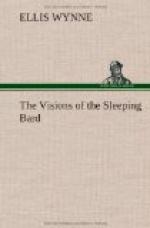I had not been looking about me long, when I heard four fiddlers, just dead, summoned to the bar. “How is it,” asked the King of Terrors, “that ye, who are so found of joy, did not stay on yonder side of the chasm? For on this side joy never existed.” “We have done no man ever any hurt,” said one of the minstrels, “but on the contrary have made them merry, and quietly took whatever was given us for our pains.” “Have ye caused no one,” said Death, “to lose time from his work, or to absent himself from church, eh?” “No,” replied another, “unless we were some Sundays after service in an inn till the morrow, or in summer time on the village green, and indeed we had a better and more beloved congregation than the parson.” “Away, with them to the land of Oblivion,” cried the terrible king, “bind the four, back to back, and pitch them to their partners, to dance barefoot on glowing hearths, and scrape their fiddles for ever without praise or pay.”
The next to come to the bar was a king from near Rome. “Raise thy hand, caitiff,” bade one of the officers. “I hope,” said he, “ye have somewhat better manners and favor for a king.” “Sirrah, you too,” said Death, “ought to have kept on the other side of the gulf where everybody is king; but know that, on this side, there are none besides myself and another, who dwelleth down below, and you shall see that that king and myself will set no value upon the degree of your greatness, but rather upon the degree of your wickedness, and so make your punishment proportionate to your crimes; therefore give answer to the questions.” “Sir, allow me to tell you that you have no authority to arrest and examine me,” said he, “I hold a pardon under the Pope’s own hand for all my sins. Because I served him faithfully, he gave me a dispensation to go straight to Paradise,




